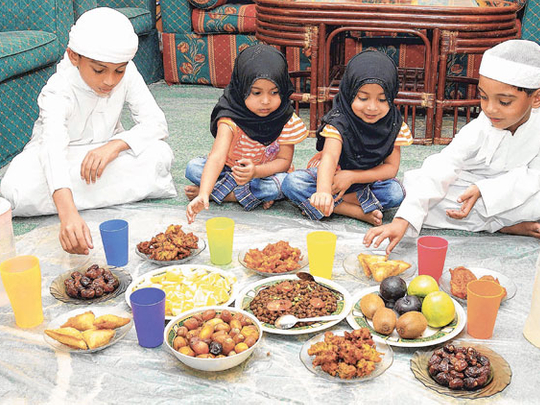
During Ramadan, though children are not obligated to fast, many do follow the example set by family members. Though school's out this Ramadan, it is still very hot. Will the children be able to cope with it?
Dubai-based Lovely Ranganathan, a nutritionist at Healthtrendz, a healthy-diet provider, says: "Once children attain puberty it is compulsory to fast, and this is not harmful. Before puberty, how each child handles fasting depends on the child's health, attitude and nutrition. But fasting is not advisable below the age of 7 or 8. Parents can introduce children gradually to the process of fasting — half-day fasting initially and, once that's successful, full-day fasting on alternate days, progressively increasing until they learn to fast the full month.
"A healthy 10-year-old can handle the fast and can take part in most physical activities. But it is difficult for many children to fast when they have to wake up early, concentrate on studies and train in sports. Fasting can make some children feel tired, drowsy or even give them headaches due to dehydration, which may require them to reduce their participation in physical exercise. Schools understand and parents can coordinate with the authorities to make things easier. Compulsion is not an option for children, since this may fail to develop positivity," Ranganathan says.
How can parents ensure children don't face problems?
"Children can be encouraged to have a healthy diet and this is easily attained if one is choosing items from each food group, namely cereals, fruit and vegetable, meat and dairy products.
"Water intake is also very important. Encourage your child to drink water by putting it on the table at mealtimes. When they are thirsty, give them water for the first glass and diluted juice for the second. Apple juice contains the slowest-releasing sugars while grape juice contains the fastest-releasing ones. So apple juice is preferable.
"Fresh fruits and juice provide much-needed vitamin C, which is essential for healthy skin. Porridge with milk, natural yoghurt, boiled eggs, grilled chicken, baked beans and wholemeal toast are healthy options. For suhour include a fortified breakfast cereal, to boost performance in studies and give them energy for sports, chicken tikka with plain boiled rice or tandoori naan, steamed fish, stir-fried noodles, bean sprouts, wholemeal spaghetti, baked potatoes, vegetable salads and fruits.
"Children should be encouraged to stay away from foods containing too much sugar, fat, salt and caffeine [sodas]. For schoolgoing children, special emphasis should be placed on calcium intake. Getting children to drink milkshakes or yoghurt-based smoothies is an excellent way to boost calcium intake. They also need plenty of iron for making blood and lean muscle.
"Parents can encourage positivity in kids by organising group activities — prayer rituals, helping the needy — which will help them understand the true spirit of Ramadan without having to strain their delicate systems before they are ready for it."
What to avoid
Do not give fizzy drinks and other sweetened drinks as treats. If you do, these drinks become associated with something good, and later in life your offspring may choose to treat themselves all the time. Instead, give fresh orange juice or pineapple juice, diluted with fizzy water. Cola drinks are especially bad because most contain caffeine.
— For more information on Healthtrendz Meal Delivery System call 04-3086338 or write to healthtrendz@dwtc.com










